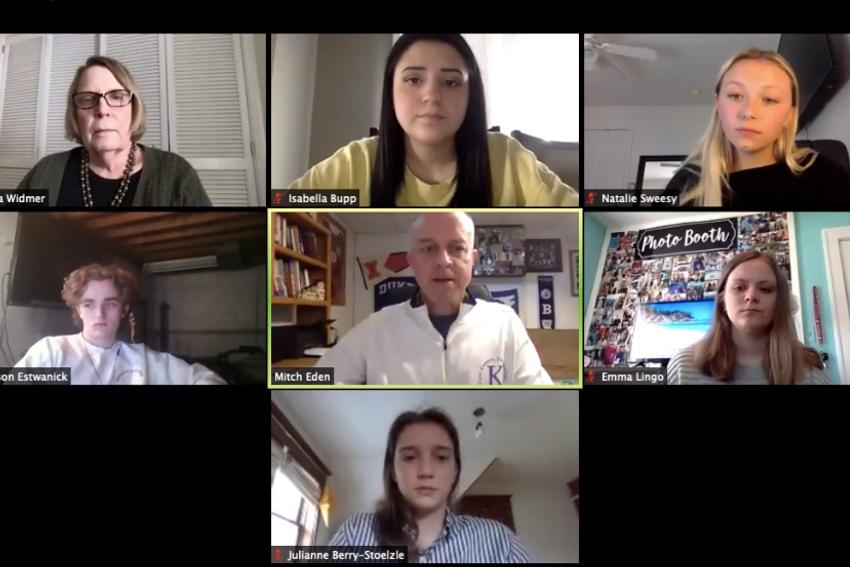
With mandates from government leaders to suspend school and stay at home, teachers scramble to find ways to continue proper education for students. From Harvard University’s free online classes to videos about AP courses from the CollegeBoard, various organizations release free resources to benefit students across the nation.
One of these organizations, the National Scholastic Press Association (NSPA), has broadcasted panels featuring journalism students and advisers over the last three weeks for its members. Run by the NSPA’s Executive Director Laura Widmer, their latest class about editorial leadership featured five students along with Media Adviser Mitch Eden.
Eden supervises the Kirkwood Call newspaper and the Pioneer Yearbook of Kirkwood High School in Missouri. Two of Eden’s students, Natalie Sweesy and Emma Lingo, spoke as part of the panel. Sweesy and Lingo serve as the editors-in-chief of the Pioneer Yearbook and Kirkwood Call, respectively.
Bella Bupp, Photo Quality Editor of The Echo yearbook for Grand Blanc High School in Michigan, Julianne Berry-Stoelzle, Sports Editor of The Little Hawk newspaper in Iowa and Jackson Estwanick, Executive Producer of The Messenger in Missouri also served on the panel.
The Feather editors-in-chiefs, Addison Schultz and Vijay Stephen, tuned in to the class in order gain knowledge and a further understanding of how to respond during the COVID-19 crisis. Panelists discussed topics from identifying resources for coverage to preparations for the next school year and for when the virus dies down.
The following tweet from the NSPA features the link to watch a recording of the NSPA’s online class about editorial leadership.
GET THE LINK to watch the April 15 Pacemaker Master Class: “Editorial leadership when it’s needed most.” https://t.co/NXvT5C23i2 pic.twitter.com/vPz3yTjzfH
— NSPA (@NSPA) April 16, 2020
Utilizing their own news sites, panelists shared examples and inspiration for coronavirus content while emphasizing the importance of trying to keep up coverage while away from school. Estwanick stressed how communities turn to news in higher rates during crises and how the increased activity leads to additional scrutiny.
The students also urged attendees to consider all students while reporting, including those which are a part of the newspaper. Bupp shared how her school’s publications team was offered the opportunity to continue working and covering the virus in order to take into account various situations and emotional and mental well being. Panelists also explained how effective reporting includes different student’s narratives and feelings.
With many students often struggling to balance responsibilities such as schoolwork and babysitting younger siblings, acknowledging a student’s hardships often helps them feel heard while inspiring others to show compassion.

Lingo shared how encouraging students and uplifting them inspires them to work harder. This additional effort from leaders motivates news staff to continue their efforts during what is often a harder time to complete work.
With many schools not planning to reconvene for the rest of the school year, Sweesy pointed out the struggle of current editors to prepare next school year’s editors and staff for their responsibilities. She recommended one-on-one online video chats and clearly laying out expectations and responsibilities as some of the best ways to equip new editors.
The NSPA’s online class not only shared sound advice for news leaders during this time, but also revealed how people across the country are often struggling with the same issues. The Feather staff is looking forward to applying some of the advice received from the panel to The Feather Online. Share your frustrations, comments and/or how your staff has adjusted to the COVID-19 shelter-in-place mandates.
For more articles, read Join the Discussion: Feather staff shares COVID-19 shelter-in-place experiences or EDITORIAL: Humanity’s altruism swells amidst COVID-19, social distancing.




